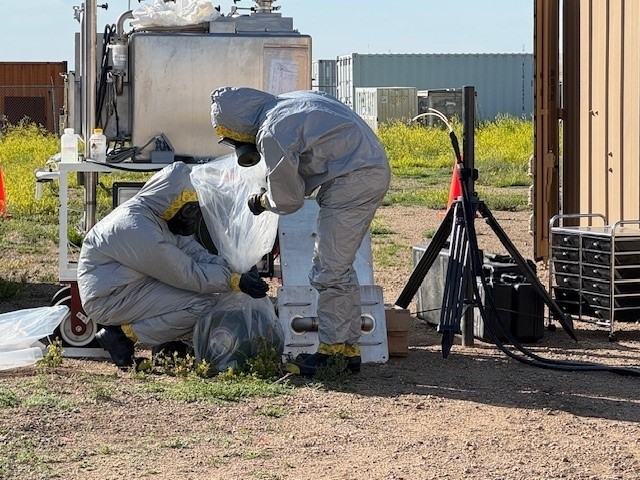July 31, 2025 – Walter T. Ham IV, 20th CBRNE Command, United States Army
U.S. Soldiers and Army civilians trained with NATO forces during live-agent Chemical, Biological, Radiological, Nuclear (CBRN) training at Exercise Precise Response on Canadian Forces Base Suffield in Alberta, Canada.
Soldiers and Army civilians from the 20th Chemical, Biological, Radiological, Nuclear, Explosives (CBRNE) Command trained with CBRN troops from Belgium, Canada, Denmark, Finland, Germany, Italy, Luxembourg, Netherlands, Norway, Sweden and the United Kingdom at the Suffield Defence Research and Development Canada (DRDC) site.
The 20th CBRNE Command’s 1st Global Field Medical Laboratory and CBRNE Analytical and Remediation Activity deployed for the exercise.
The 20th CBRNE Command is the U.S. military’s premier deployable and multifunctional CBRNE formation. Soldiers and Army civilians from the 20th CBRNE Command routinely deploy from 19 bases in 16 states to confront and defeat the world’s most dangerous hazards in support of joint, interagency and multinational operations.
The 1st Global Field Medical Laboratory sent Soldiers from the Occupational Health Threat Assessment Team to the exercise to serve at the multinational radiological laboratory with the German Bundesweher Radiological Support Staff.
During the exercise, the team processed 80 radiological samples.
Army civilians from the CBRNE Analytical and Remediation Activity’s Mobile Expeditionary Laboratory also honed their skills during the exercise.
Jessica J. Caldwell, a Supervisory Chemist from CARA’s Mobile Expeditionary Laboratory, said CARA provided theater validation chemical laboratory support to NATO Sampling and Identification of Biological, Chemical, and Radiological Agents (SIBCRA) teams.
“The exercise validated internal operating procedures while working with live chemical warfare agents and strengthened interoperability between partner nations, preparing the laboratory for potential NATO deployments,” said Caldwell, a Baltimore native who earned her bachelor’s degree in chemistry from the University of Virginia.
“A key benefit of the exercise was providing real-time feedback to SIBCRA teams on their sampling, packaging and documentation, which demonstrably improved their performance,” said Caldwell.
Kevin P. Wioland, a CARA Mobile Expeditionary Laboratory Supervisory Chemist, said the exercise strengthened the laboratory capability of the Army civilian activity.
Headquartered on Aberdeen Proving Ground, Maryland, CARA also supports remediation missions at Formerly Used Defense Sites and conducts emergency responses, overseas and stateside, to characterize and assess Recovered Chemical Warfare Materiel.
Wioland said Canadian Forces Base Suffield provided an ideal environment for the exercise because of the highly skilled Defence Research and Development Canada Suffield staff, unique and challenging target sites and live agent environment at the remote location.
“Exercises like Precise Response enable the CARA Mobile Expeditionary Laboratory to train with and support partner nations by providing theater validation laboratory analysis of chemical and biological warfare materials,” said Wioland, a native of Jackson, New Jersey, who earned a master’s degree in forensic chemistry from Towson University.
“The training with diverse partners helps the laboratory understand variations in equipment, sampling techniques and packaging containers,” said Wioland. “Recognizing these differences allows Mobile Expeditionary Lab to deliver higher quality laboratory support.”
Original: NATO forces conduct live agent training during Exercise Precise Response in Canada
